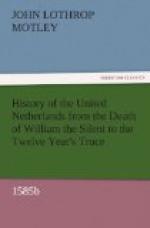Yet Alexander was never more truly heroic than in this position of vast entanglement. Untiring, uncomplaining, thoughtful of others, prodigal of himself, generous, modest, brave; with so much intellect and so much devotion to what he considered his duty, he deserved to be a patriot and a champion of the right, rather than an instrument of despotism.
And thus he paused for a moment—with much work already accomplished, but his hardest life-task before him; still in the noon of manhood, a fine martial figure, standing, spear in hand, full in the sunlight, though all the scene around him was wrapped in gloom—a noble, commanding shape, entitled to the admiration which the energetic display of great powers, however unscrupulous, must always command. A dark, meridional physiognomy, a quick; alert, imposing head; jet black, close-clipped hair; a bold eagle’s face, with full, bright, restless eye; a man rarely reposing, always ready, never alarmed; living in the saddle, with harness on his back—such was the Prince of Parma; matured and mellowed, but still unharmed by time.
The cities of Flanders and Brabant he determined to reduce by gaining command of the Scheldt. The five principal ones Ghent, Dendermonde, Mechlin, Brussels Antwerp, lie narrow circle, at distances from each other varying from five miles to thirty, and are all strung together by the great Netherland river or its tributaries. His plan was immensely furthered by the success of Balthasar Gerard, an ally whom Alexander had despised and distrusted, even while he employed him. The assassination of Orange was better to Parma than forty thousand men. A crowd of allies instantly started up for him, in the shape of treason, faintheartedness, envy, jealousy, insubordination, within the walls of every beleaguered city. Alexander knew well how to deal with those auxiliaries. Letters, artfully concocted, full of conciliation and of promise, were circulated in every council-room, in almost every house.
The surrender of Ghent—brought about by the governor’s eloquence, aided by the golden arguments which he knew so well how to advance—had by the middle of September (19th Sept. 1584), put him in possession of West Flanders, with the important exception of the coast. Dendermonde capitulated at a still earlier day; while the fall of Brussels, which held out till many persons had been starved to death, was deferred till the 10th March of the following year, and that of Mechlin till midsummer.
The details of the military or political operations, by which the reduction of most of these places were effected, possess but little interest. The siege of Antwerp, however, was one of the most striking events of the age; and although the change in military tactics and the progress of science may have rendered this leaguer of less technical importance than it possessed in the sixteenth century, yet the illustration that it affords of the splendid abilities of Parma, of the most cultivated mode of warfare in use at that period, and of the internal politics by which the country was then regulated, make it necessary to dwell upon the details of an episode which must ever possess enduring interest.




